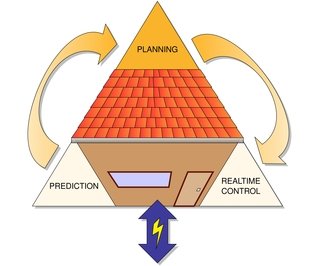We are part of a larger collective of energy research taking place at the University of Twente. For more information on what other groups are doing please click here.
The world of energy is changing rapidly and will continue to do so in the future. This change is fuelled by political and environmental reasons to move away from the use of high carbon emitting fossil fuels to renewable energy sources (RES) such as wind, solar and hydro. The conventional system of electricity being produced in bulk by large facilities is changing to system where electricity is produced in a more distributed matter in smaller amounts, closer to where it is consumed. Examples of this are photovoltaic (PV) panels placed on rooftops and small scale wind farms placed near cities. This results in the power flow changing from being unidirectional from power plants to consumers to being bidirectional, with a flow ‘upstream’ during periods of high RES feed-in in certain areas.
Furthermore society is seeing an ever increasing use of electrical appliances replacing others running on fossil fuels such as electric heating systems and electric cars. This electrification of society together with the change to distributed generation (DG) poses major challenges within the construction, maintenance and reinforcement of the electricity grid which was built around the traditional philosophy. Many of these challenges call for innovative solutions found by multidisciplinary research.

To tackle these challenges the usual vision is to move to a smart grid; an energy grid that allows for more efficient use of all forms of energy through the use of “smart” solutions. These solutions come in the form of information and communication technologies on all levels in the grid, from a “smart” device in households to improved forecasting and modelling on national or even international levels of the grid. To tackle many interesting questions in the research area of smart grids the Computer Architecture for Embedded Systems (CAES) and Discrete Mathematics and Mathematical Programming (DMMP) groups of the department of Electrical Engineering, Computer Science and Applied Mathematics have combined their strength in our energy research group Energy in Twente.
Our approach to a smart grid consists of several focus areas for research. The main tool in all areas is an internal simulator called DEMKit which we use to gain insights in many interesting topics concerning energy. These topics include, but are not limited to, demand-side management, micro-grids, integration of energy storage, markets and price mechanisms, and safety and security.
Demand-side management
The integration of uncontrollable renewable energy sources (RES) such as wind and solar can cause major problems for the stability of the power grid, as the grid needs to be in constant balance. Whereas generation of conventional power plants can be scaled up and down as required to maintain balance, most RES cannot. This asks for a more sophisticated approach to matching supply and demand if a high level of RES integration is desired. Demand-side management focuses on finding and exploiting flexibility on the consumer side to improve this matching. Examples of this flexibility include the charging of electric vehicles, use of heat pumps, and load cycles of white goods.
Micro-grids
Micro-grids are small sections of the distribution grid, usually consisting of a small neighborhood or even a single (large) building. They only contain local parts of the main grid, such as the low-voltage distribution network or internal heat distribution systems. Research into micro-grids is focused on investigating their potential and limitations to support integrating (renewable) distributed generation of electricity, options for CO2 neutral operation, the potential of operating disconnected from the main grid, and their ability to support the main grid.
Integration of energy storage
With the development of new batteries and other techniques such as flywheels, the possibilities of storing (large amounts of) electricity and heat are opening up in the future. Integration of systems exploiting these techniques can aid in the requirement of constant balance in the distribution grid as well as assist with power and heat quality issues. Nevertheless, the available systems remain very expensive. This calls for thorough research in the possibilities of energy storage systems as an economically feasible alternative to conventional solutions.
Markets and price mechanisms
The structure of current energy markets and tariffs for consumers is based on the traditional energy system where there is just one big supplier and no infeed of renewable energy sources (RES). However, in smart grids, there are many local suppliers (prosumers) and a large integration of RES. Thus, research is needed to design new markets and tariff systems that allow for fair pricing within smart grids. For this, we combine technical knowledge of smart grids with insights on pricing and fairness from economics and psychology. Topics of interest within this area include self-organizing market places, energy communities, and fair cost allocation schemes.
Safety and security
The world sees an increase in cyber-attacks on digital infrastructures that can disrupt organizations or even whole countries and economies. Smart grids are in that sense an attractive target since the world cannot go without energy. Therefore, it is important to that any ICT-system that controls our grid assets is robust against cyber-attacks and that they have minimal impact on the operation of the system in case an attacker manages to get in. Within this area, we conduct research on secure communication systems, distributed security monitoring, and islanded operation of micro-grids.

